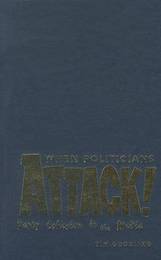
|
When Politicians Attack: Party Cohesion in the Media
Hardback
Main Details
| Title |
When Politicians Attack: Party Cohesion in the Media
|
| Authors and Contributors |
By (author) Tim Groeling
|
| Series | Communication, Society and Politics |
|---|
| Physical Properties |
| Format:Hardback | | Pages:256 | | Dimensions(mm): Height 237,Width 158 |
|
| ISBN/Barcode |
9780521842099
|
| Classifications | Dewey:324.22 |
|---|
| Audience | | Professional & Vocational | |
|---|
| Illustrations |
34 Tables, unspecified; 4 Halftones, unspecified
|
|
Publishing Details |
| Publisher |
Cambridge University Press
|
| Imprint |
Cambridge University Press
|
| Publication Date |
19 July 2010 |
| Publication Country |
United Kingdom
|
Description
Fostering a positive brand name is the chief benefit parties provide for their members. They do this both by coordinating their activities in the legislative process and by communicating with voters. Whereas political scientists have generally focused on the former, dismissing partisan communication as cheap talk, this book argues that a party's ability to coordinate its communication has important implications for the study of politics. The macro-level institutional setting of a party's communication heavily influences that party's prospects for cohesive communication. Paradoxically, unified government presents the greatest challenge to unified communication within the president's party. As this book argues, the challenge stems primarily from two sources: the constitutional separation of powers and the intervening role of the news media.
Author Biography
Tim Groeling is Associate Professor of Communication Studies at UCLA. With Matthew A. Baum, he is the co-author of War Stories: The Causes and Consequences of Public Views of War. His articles have appeared in the Journal of Politics, International Organization, Political Communication, Political Behavior, and Presidential Studies Quarterly, among other publications.
Reviews'... clearly written and organized. [This book] contains engaging prose and many vivid examples to illustrate its argument. It would be a good choice for graduate classes or advanced undergraduate classes on political communication, parties, or Congress.' Jonathan M. Ladd, Public Opinion Quarterly
|